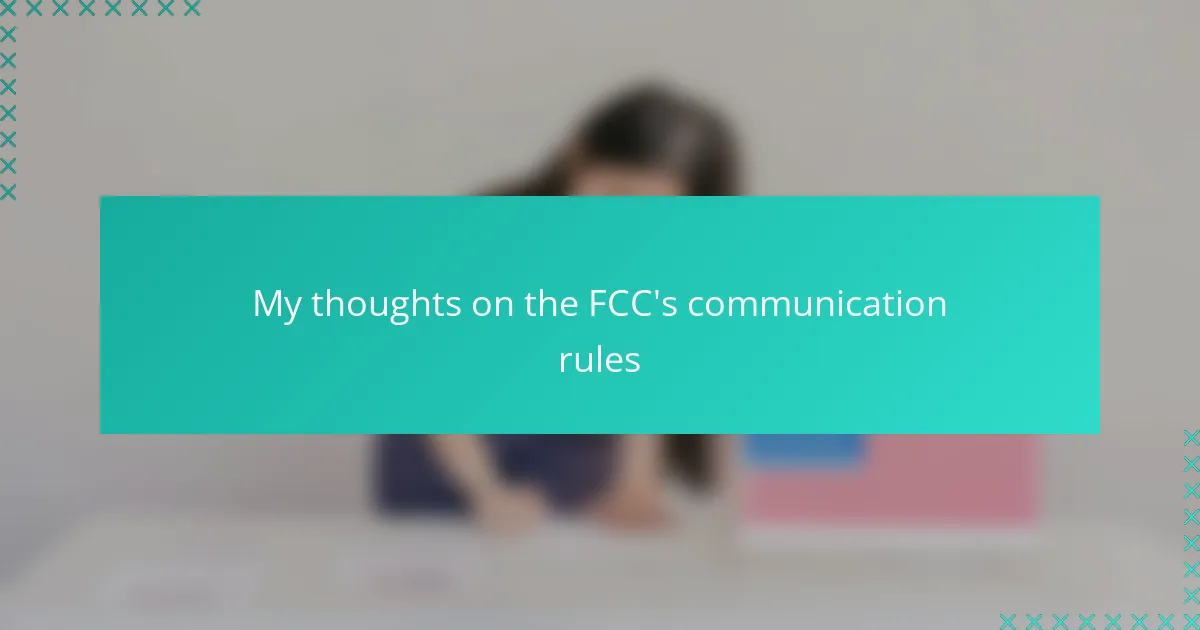Key takeaways
- FCC communication rules balance public interest with free speech but require adaptability to keep pace with technological changes.
- Global communication regulations vary by country, influenced by local culture and politics, affecting news coverage and internet access.
- The FCC’s policies have international implications, shaping diplomatic narratives and impacting global media freedom and cybersecurity discussions.
- Future FCC policies should emphasize flexibility, transparency, and international cooperation to effectively address the complexities of global communication landscapes.
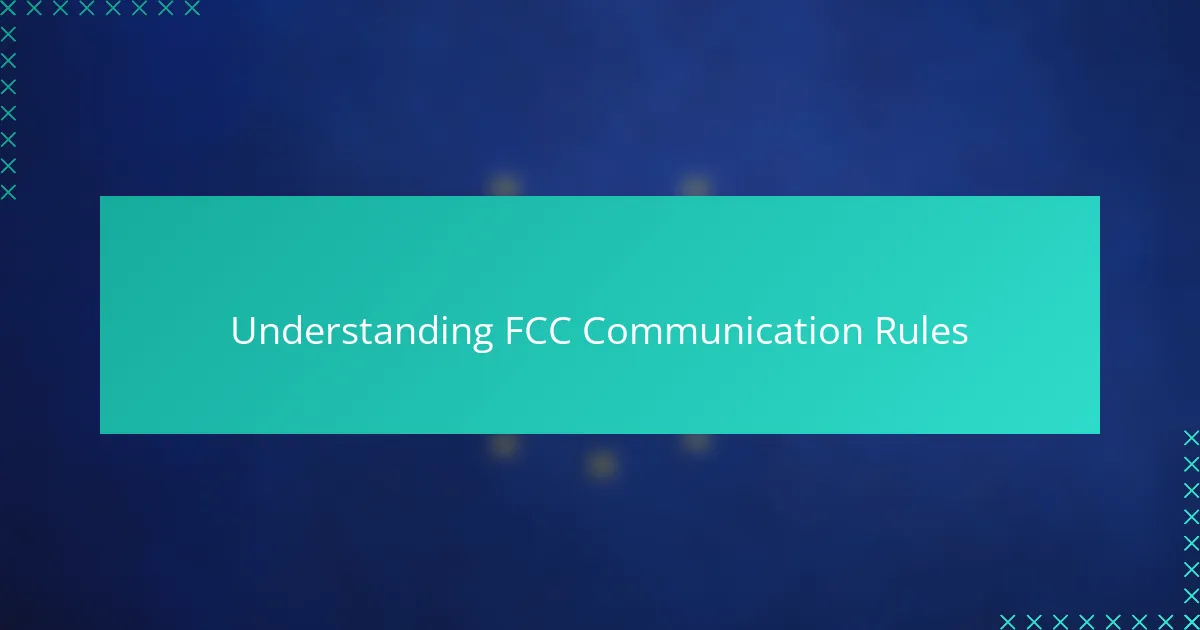
Understanding FCC Communication Rules
Understanding the FCC’s communication rules often feels like navigating a maze of regulations designed to balance openness with control. Have you ever wondered why certain content gets priority or why some broadcasts face strict limitations? From my experience, these rules are not just technicalities but reflect deeper values about free speech and public interest.
I recall the first time I delved into FCC guidelines—I was struck by how complex yet purposeful the framework seemed. The rules cover everything from decency standards to spectrum allocation, illustrating the agency’s role in shaping what and how information reaches us. It’s fascinating, even a little daunting, to see how this regulatory body influences the very media landscape many of us take for granted.
What intrigues me most is how these rules evolve with technology and society’s changing norms. It’s not just about static policies; it’s a dynamic conversation. Understanding this helps us appreciate the delicate dance between regulation and innovation in communications. Without these rules, how would we even begin to manage the flood of voices clamoring for attention?
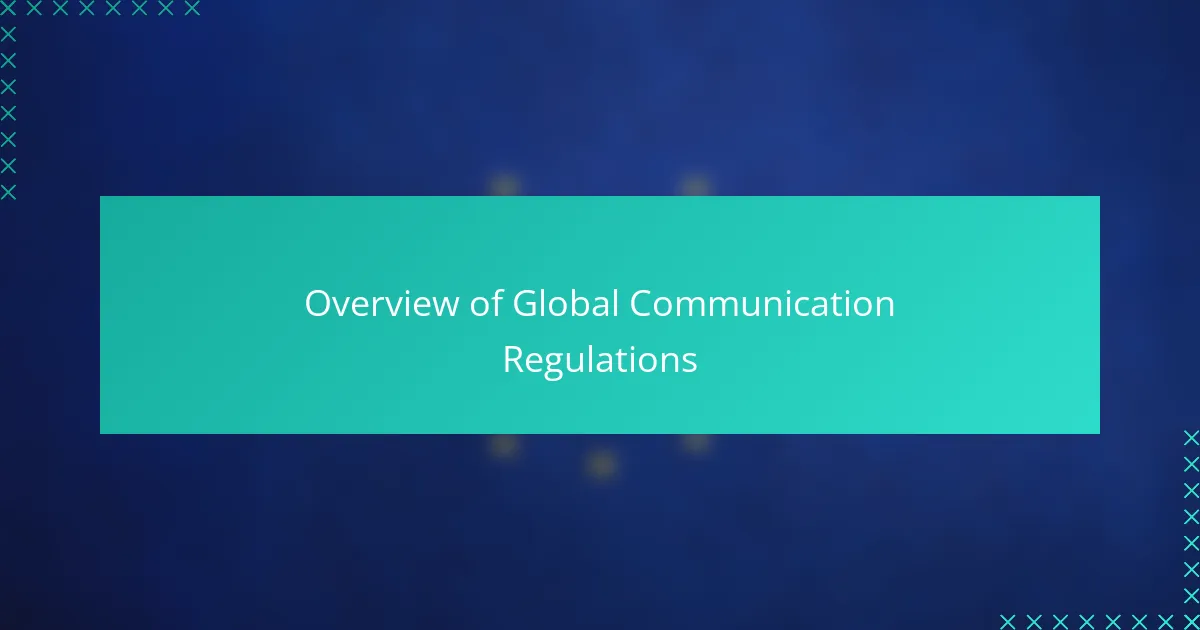
Overview of Global Communication Regulations
Around the world, communication regulations share a common goal: managing the flow of information while protecting public interests. Yet, each country’s approach varies widely, shaped by its unique history, culture, and political landscape. This diversity fascinates me because it shows how deeply communication policy intertwines with national identity.
I’ve noticed that some nations emphasize strict government control to maintain social order, while others lean toward market-driven models promoting competition and innovation. Have you ever stopped to think about how these choices affect everything from news coverage to internet access? It’s clear that global regulations reflect more than just rules—they reveal competing visions of freedom and control.
In my view, understanding these international frameworks is essential for grasping how information travels and influences societies today. The fast-paced evolution of technology forces regulators everywhere to constantly rethink their strategies. Watching this unfold reminds me that communication is not just about technology—it’s about power, culture, and values in constant negotiation.
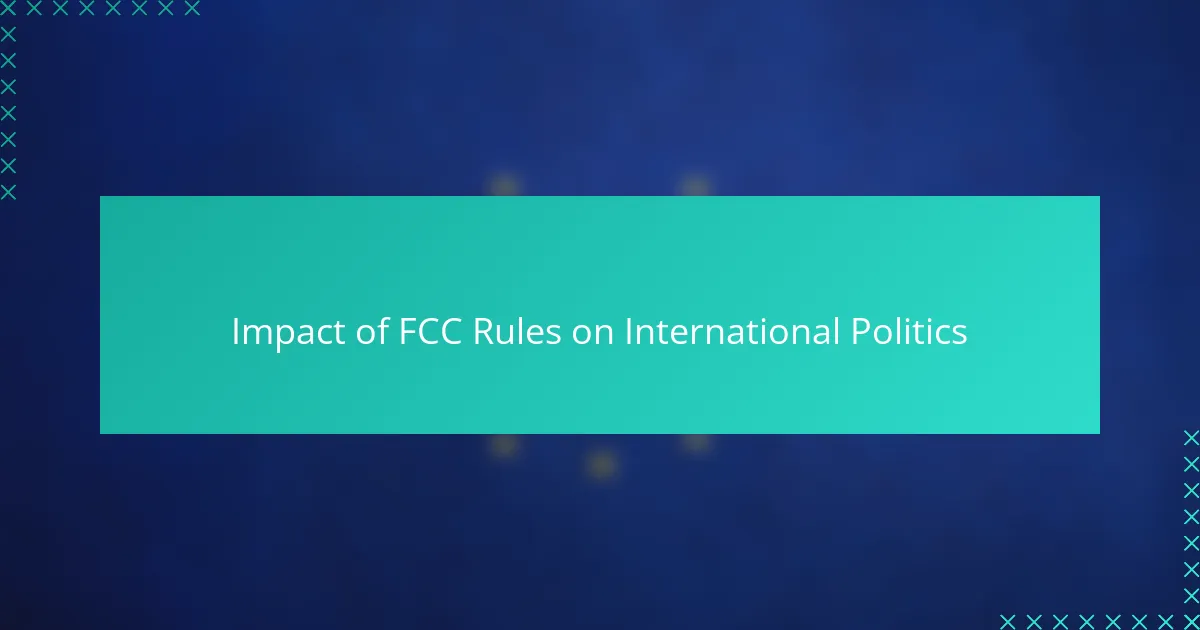
Impact of FCC Rules on International Politics
When I first considered how FCC rules ripple beyond America’s borders, I was struck by their subtle yet profound influence on international politics. How often do we pause to think that what the FCC allows or restricts domestically can shape diplomatic narratives and cross-border information flows? It’s clear to me that controlling communication channels at home inevitably impacts global dialogues and alliances.
From my perspective, the FCC’s governance of spectrum allocation and content standards indirectly affects how other nations engage with the U.S. politically and culturally. Have you noticed how broadcast regulations can sometimes set precedents or create tensions in international negotiations about media freedom and cybersecurity? These rules become more than internal policy; they act as signals of American values and priorities on the world stage.
Reflecting on this, I realize how entwined communication regulation is with soft power strategies. The FCC’s stance on openness or restriction can either bolster the U.S.’s influence abroad or invite criticism from countries advocating different models of media control. This dynamic underscores for me that communication policies are far from isolated—they are key threads weaving through the fabric of international relations.
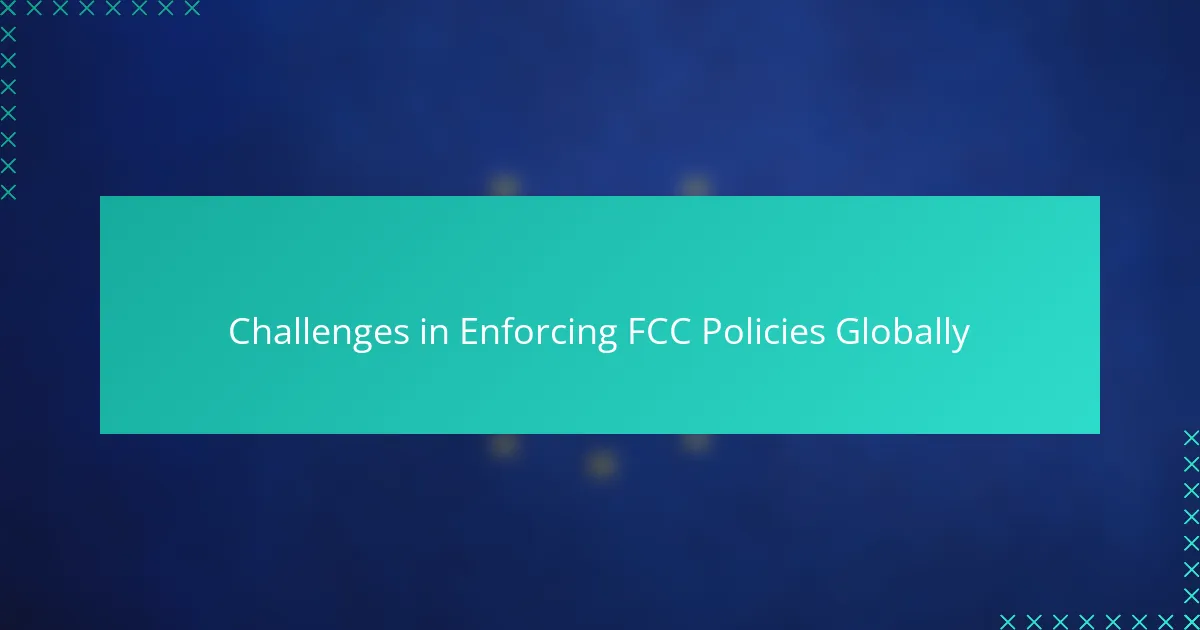
Challenges in Enforcing FCC Policies Globally
Enforcing FCC policies beyond U.S. borders feels like trying to fit a square peg into a round hole. I’ve often wondered how rules born from American legal and cultural contexts can be applied fairly in places where values and governance styles differ so dramatically. Does it make sense to expect uniform compliance when regulatory philosophies span a vast spectrum worldwide?
One example that sticks with me is how spectrum management—a technical but crucial aspect of FCC regulation—runs into conflicting priorities in various countries. While the FCC aims for efficient, interference-free use, some nations prioritize sovereignty or economic control, which can clash with U.S.-centered standards. This disparity often transforms enforcement from a matter of policy into a delicate dance of diplomacy and respect for national autonomy.
I’ve also noticed that technology’s borderless nature complicates enforcement immensely. Take online content monitored or restricted by the FCC domestically—outside U.S. jurisdiction, these rules hold little water. It almost feels like trying to control the ocean’s tides with a garden hose. How then can any regulator, no matter how powerful, fully enforce policies when digital communication flows freely across invisible borders? This challenge calls for more than enforcement; it demands international cooperation and nuanced understanding.
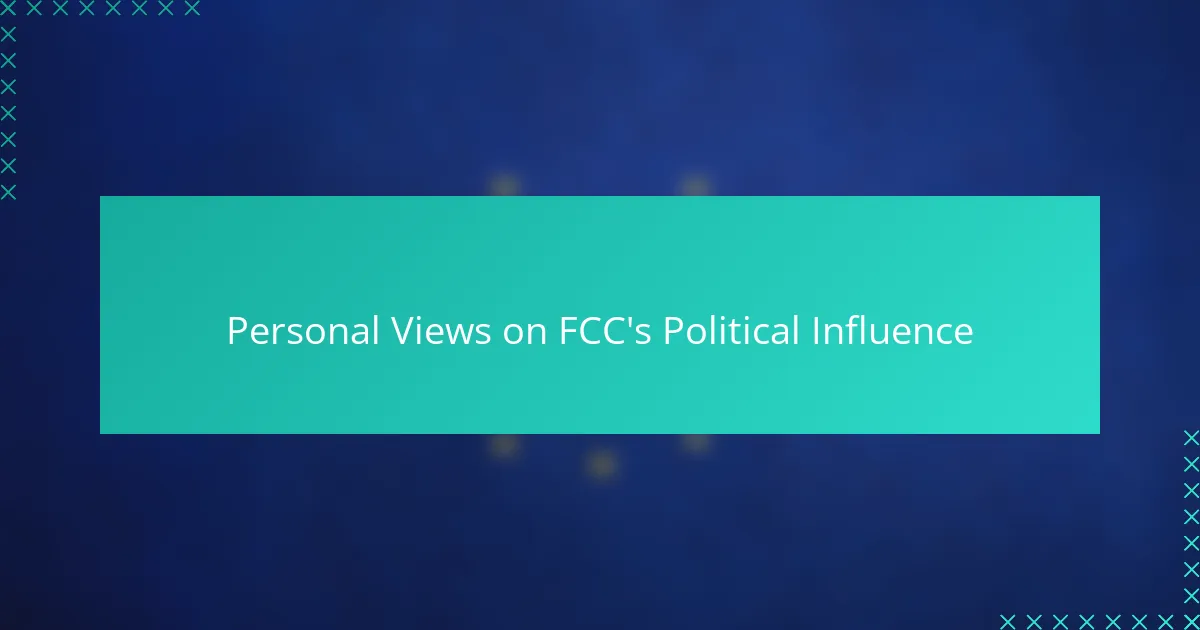
Personal Views on FCC’s Political Influence
When I reflect on the FCC’s political influence, I can’t help but think about how deeply interwoven the agency is with the shifting tides of American power. Have you ever considered how a body primarily known for regulating airwaves quietly shapes political narratives? From my experience, the FCC’s decisions often mirror broader political agendas, subtly steering public discourse in ways we rarely stop to examine.
I remember a particular moment when I saw how political interests seeped into regulatory choices—certain content restrictions seemed less about public welfare and more about controlling which voices get magnified. This made me question the true impartiality of the FCC. Isn’t it striking how an agency meant to ensure fairness can sometimes act as a gatekeeper for political influence?
What puzzles me most is the delicate balance the FCC tries to maintain between neutrality and political pressure. It’s like walking a tightrope, where each step affects not only media landscapes but also democratic engagement. Could the FCC do more to shield itself from partisan swings, or is political influence just an inevitable part of regulating communication in a complex democracy?
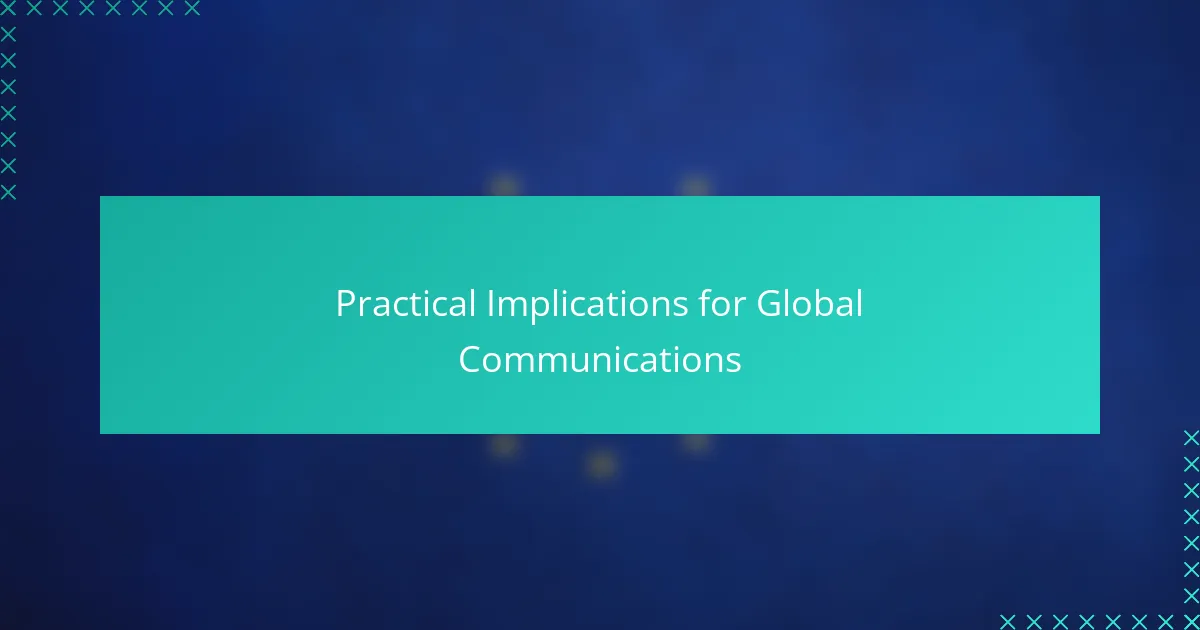
Practical Implications for Global Communications
When I think about the practical implications of FCC rules on global communications, I realize how these U.S.-centric regulations often create ripple effects across international networks. Have you ever considered how a policy designed for American airwaves can influence satellite transmissions or internet traffic that crosses multiple borders? From my experience, this creates a complex web where local rules unexpectedly shape global communication behaviors.
One vivid example I recall is how spectrum allocation decisions by the FCC can either enable or restrict foreign broadcasters looking to reach American audiences. This doesn’t just affect business—it changes who gets to participate in cultural and political exchanges. It’s fascinating, yet a bit unsettling, to see how technical rulemaking can wield such soft power internationally.
Yet, I often wonder how effective these rules really are beyond U.S. borders, given the unique governance and technological landscapes worldwide. In practice, enforcement requires more than just regulations; it demands diplomacy, collaboration, and a deep understanding of diverse priorities. Isn’t that a reminder that global communication isn’t just about laws—it’s about relationships and trust?
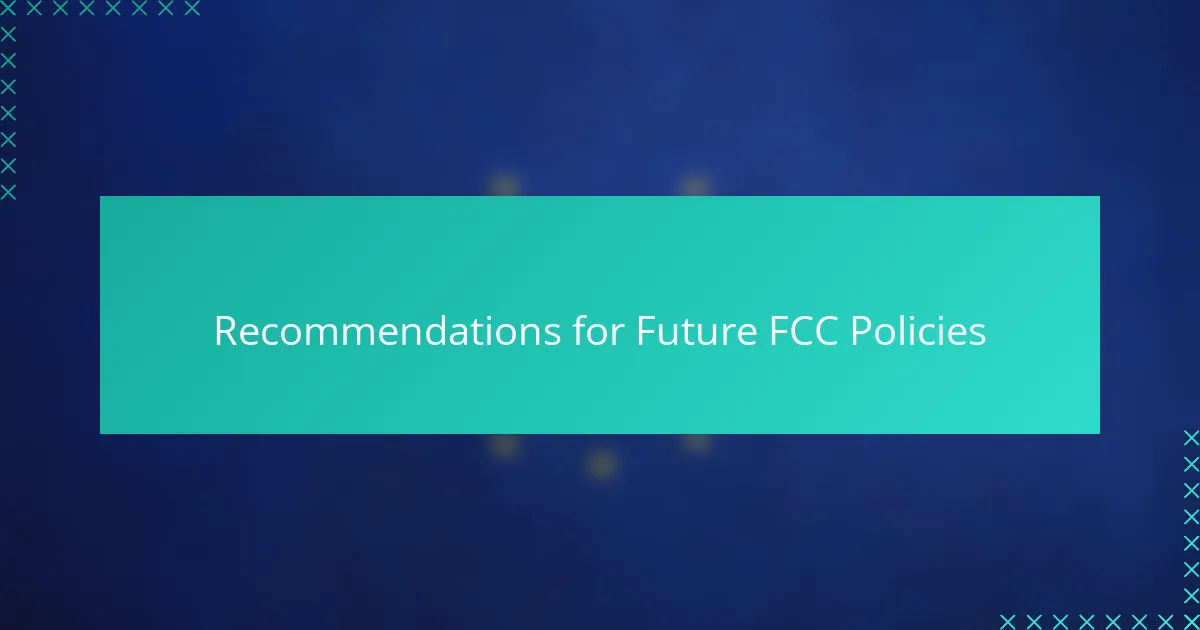
Recommendations for Future FCC Policies
When thinking about future FCC policies, I believe they need to embrace greater flexibility to keep pace with rapidly evolving technologies. Have you ever felt frustrated by a rule that seemed stuck in the past while the world moved on? From what I’ve seen, adaptable frameworks that anticipate innovation rather than react to it could make FCC regulation more effective and less burdensome.
Another point I find crucial is transparency. I recall occasions when regulatory decisions felt opaque, leaving many of us guessing about the underlying motives. Wouldn’t it build more trust if the FCC openly communicated not only what rules are in place but also why they matter? Clearer dialogue could bridge gaps between regulators, industry players, and the public, fostering collaboration instead of confusion.
Lastly, I think the FCC should prioritize international cooperation as a cornerstone of its future policies. Watching how digital boundaries blur daily, I often wonder how realistic it is for any single agency to act alone. Could the FCC take a more active role in global dialogue to harmonize standards and better manage cross-border challenges? From my perspective, it’s essential if we want communication policies that are both practical and respectful of diverse global realities.
